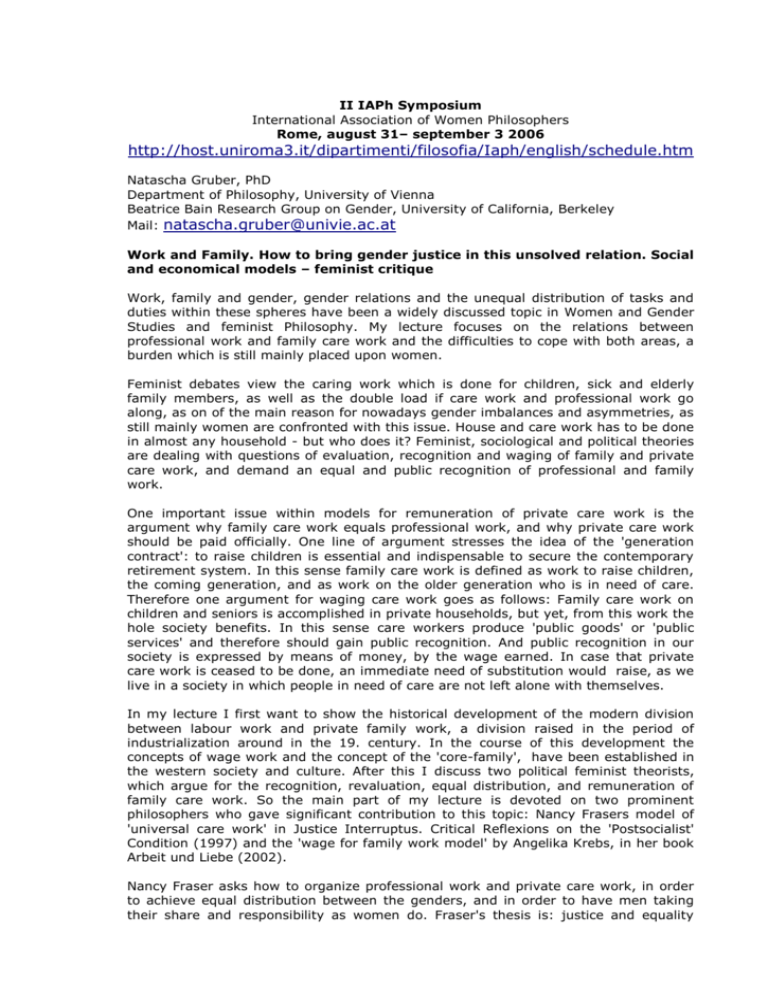Natascha Gruber, PhD
advertisement

II IAPh Symposium International Association of Women Philosophers Rome, august 31– september 3 2006 http://host.uniroma3.it/dipartimenti/filosofia/Iaph/english/schedule.htm Natascha Gruber, PhD Department of Philosophy, University of Vienna Beatrice Bain Research Group on Gender, University of California, Berkeley Mail: natascha.gruber@univie.ac.at Work and Family. How to bring gender justice in this unsolved relation. Social and economical models – feminist critique Work, family and gender, gender relations and the unequal distribution of tasks and duties within these spheres have been a widely discussed topic in Women and Gender Studies and feminist Philosophy. My lecture focuses on the relations between professional work and family care work and the difficulties to cope with both areas, a burden which is still mainly placed upon women. Feminist debates view the caring work which is done for children, sick and elderly family members, as well as the double load if care work and professional work go along, as on of the main reason for nowadays gender imbalances and asymmetries, as still mainly women are confronted with this issue. House and care work has to be done in almost any household - but who does it? Feminist, sociological and political theories are dealing with questions of evaluation, recognition and waging of family and private care work, and demand an equal and public recognition of professional and family work. One important issue within models for remuneration of private care work is the argument why family care work equals professional work, and why private care work should be paid officially. One line of argument stresses the idea of the 'generation contract': to raise children is essential and indispensable to secure the contemporary retirement system. In this sense family care work is defined as work to raise children, the coming generation, and as work on the older generation who is in need of care. Therefore one argument for waging care work goes as follows: Family care work on children and seniors is accomplished in private households, but yet, from this work the hole society benefits. In this sense care workers produce 'public goods' or 'public services' and therefore should gain public recognition. And public recognition in our society is expressed by means of money, by the wage earned. In case that private care work is ceased to be done, an immediate need of substitution would raise, as we live in a society in which people in need of care are not left alone with themselves. In my lecture I first want to show the historical development of the modern division between labour work and private family work, a division raised in the period of industrialization around in the 19. century. In the course of this development the concepts of wage work and the concept of the 'core-family', have been established in the western society and culture. After this I discuss two political feminist theorists, which argue for the recognition, revaluation, equal distribution, and remuneration of family care work. So the main part of my lecture is devoted on two prominent philosophers who gave significant contribution to this topic: Nancy Frasers model of 'universal care work' in Justice Interruptus. Critical Reflexions on the 'Postsocialist' Condition (1997) and the 'wage for family work model' by Angelika Krebs, in her book Arbeit und Liebe (2002). Nancy Fraser asks how to organize professional work and private care work, in order to achieve equal distribution between the genders, and in order to have men taking their share and responsibility as women do. Fraser's thesis is: justice and equality between genders can only be promoted and achieved when private care work is distributed equally, when both genders participate and carry the same share. In her book Fraser develops a model of 'universal care work', which goes along with the political demand, that today's men should become more in a way as today's women are – that means, become person who manage both professional work and private care work at the same time. In order to realize such a vision, it would be important to provide public and social incentives on many levels, via media, education, socialization for example to change and alter the cultural images of boys and men, of 'manliness' in our current society. Angelika Krebs discusses three models of justice in families: The 'wage for housework model', the 'model of a part time work society' and the 'wage for family care work model', whereas this last model is a synthesis of the two first, and developed by Krebs. Angelika Krebs argues on two levels: First there is the ethical demand for a just and equal distribution of work, as well as the ethical demand for recognition and remuneration of all kinds of care work, which provide persons in need of care a life in safeness, comfort and human dignity. But the form of recognition, which Krebs has in mind, is not meant to be a praise or gratitude for the 'good mummy"; as on this care work done the entire society depends on, therefore the form of recognition has to be a public one, which is, in our society, expressed with monetary means. Second: with the political and economical argumentation Krebs stresses our current public retirement system, which financed by allocation, with the payments of each working adult generation. Krebs diagnoses for our current society not only a division between the sexes, between women and men, but also a division between singles and couples with double income but no kids (dinks) and families who live with children or elderly, sick people in need for care, in short, families with care duties. Singles and dinks, Krebs argues, pay during their work life into retirement funds, and therefore fulfil one half of the generation contract, this is through their payments, with which current retirements are paid. But, as they do not raise kids on their own, they depend on the next generation and therefore on families who raise children today, those who will fill the retirement funds when they are adults, to secure future retirement payments. All this models I'd like to discuss are of great relevance for women, as they are still the ones, from whom society expects to accept the burden and responsibility of care and family work. But at the same time it is important to discuss, if this models who argue for a waging of care work, also are able to promote more gender justice in this field, which would in fact mean: a significant higher participation of men taking over responsibility for up rearing children and care work on elderly family members. So, even if family care work would be paid by public funds, and would be raised in image, the outcome should not be that still again mainly women will carry the burden or double burden of family care work and professional work. Social and political reforms could change our concepts of family as well as our concepts of professional work. In the field of occupational work it would be important to reform or transform the definition of work altogether; e.g. definitions of professional pathways and careers, weekly working hours, job postings linked to age, etc. The models of Krebs and Fraser imply a certain family system, the 'heterosexual core family'. It has to be discussed, in which way alternative family and community forms, like elective affinities, chosen families, gay- and lesbian families or communes are able to cope with the difficult relation between employment and family care work more efficiently, and with more gender justice and fairness. Basic Literature: Krebs, Angelika: Arbeit und Liebe. Die philosophischen Gerechtigkeit. Frankfurt a.M.: Suhrkamp, 2002. Grundlagen sozialer Fraser, Nancy: „Nach dem Familienlohn: Ein postindustrielles Gedankenexperiment“, in: Die halbierte Gerechtigkeit. Frankfurt a.M.: Suhrkamp, 1997. [Orig. Justice Interruptus. Critical Reflexions on the 'Postsocialist' Condition, New York 1994.] Okin, Susan Moller: Justice, Gender, and the Family. New York: Basic Books, 1989.











